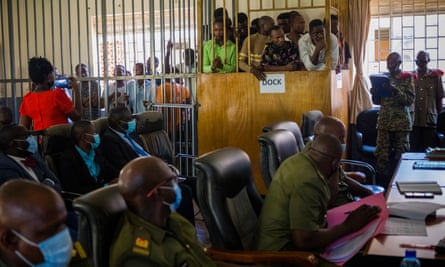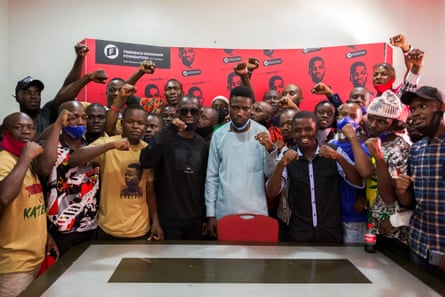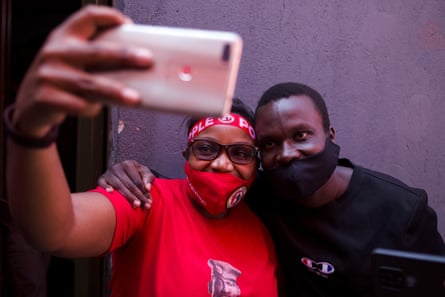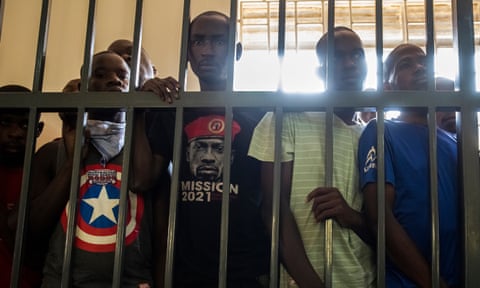Opposition activists who spent months behind bars in Uganda have described systematic physical abuse, denial of basic legal rights and appalling conditions as they waited for trial on charges they claim were fabricated.
The experiences of the activists, revealed to the Guardian after their release last month, will increase pressure on Uganda, a key western ally in east Africa, over human rights failings that have grown significantly worse since the country’s president, Yoweri Museveni, started to face a significant political challenge in recent years.
Since campaigning opened last year for elections held in January, hundreds – possibly thousands – of supporters of the opposition politician, Robert Kyagulanyi, have been arrested and illegally detained for months in the worst wave of repression for decades.
Others, snatched off the streets by security services in a series of abductions, have disappeared into secret jails. More than 50 people were killed during protests in November. Most were shot by security forces.
Among those arrested in the past seven months were more than 120 activists working with Kyagulanyi – who is a former reggae singer also known as Bobi Wine – detained on 30 December on charges of inciting violence after protests following their leader’s arrest for breaking Covid regulations.
Though many were released or bailed, 49 detainees, including many of Kyagulanyi’s close aides, were subsequently diverted from civilian courts to a military barracks before being charged with the serious crime of possessing four rounds of live ammunition.
The men said they were pepper-sprayed and beaten by police while handcuffed during their arrests in December, and then, once confined to a cell, forced to strip naked and perform exercises while being hit with cables and wires by men who appeared to be soldiers. At least one had severe pressure applied to his genitals.

“The military officers had these electric cable wires and batons,” said Ali Bukeni, Kyagulanyi’s musical and political partner. “These guys made our colleagues who were handcuffed to frog jump while caning and kicking them. Many of them got injuries.”
Eddy Ssebuufu, Kyagulanyi’s head of security and bodyguard, said guards told him to prepare to die. “They asked me to say my last prayers. I told them, you can’t kill me … We are in a struggle for liberation,” he said.
Conditions in detention were poor, the released men said. While held at the Kitalya maximum security prison, they were forced into cells so overcrowded that men slept on their sides, urinating where they lay to avoid losing their place on the ground. Months spent in a military detention in Masaka in the south-west were no better.
“They gave us a bucket to put on the corner. That’s where we used to urinate and defecate,” Ssebuufu said. “We had to endure the bad smell the whole night. We would pour it in the morning. We would rotate to sleep. Some would sleep and others would stand.”
The detainees said they had been denied access to lawyers and family for most of their six-month detention, and were held in complete isolation. No newspapers were allowed and the only television showed children’s cartoons.
“We were locked out of the world,” said Bukeni, who described the denial of contacts as “psychologically torturing”.
Museveni, 76, has been in power for 35 years and has strong support in some rural areas, as well as among the military, security services and police. The US and UK have given billions of dollars of development and security assistance to Uganda in recent years. Both have made their deepening concerns at recent human rights abuses clear.
Though the jailed men were in detention at the time of the alleged offence, they were held until mid-June, when they were bailed at Uganda’s military general court martial in the capital, Kampala.
Museveni claimed victory in the election in January, which was marred by allegations of fraud and the harassment of opposition activists.

Kyagulanyi’s National Unity Platform has listed more than 600 members and activists said to have been detained. NUP officials believe the true figure is likely to be more than 1,000. Some of those snatched from the streets have been sentenced after cursory hearings in the courts. Many are not brought to court at all.
On release, many reported systematic torture, detention in harsh conditions in often secret prisons and the denial of access to relatives or lawyers.
“Five military men came. They called us one by one,” said Ssebuufu. “You are taken into a small room and told to undress. They told me to remove my shirt, mask, stockings and trousers. I remained in my boxers. They ordered me to take off the boxers too. I asked why. One soldier cocked his gun and asked: are you refusing? So I had to take them off. They told me to stand in the corner and bend [over]. The guy started squeezing my genitals. The pain was unbearable. I was crying.”

Daniel Brenny Oyerwot, Kyagulanyi’s music producer and sound engineer, said he had been driving to a campaign meeting in December when his vehicle was stopped by a combined force of ordinary soldiers, special forces commanded by Museveni’s son, and police.
“We were forcefully pulled out of the cars. Some of the car windscreens were smashed … We were handcuffed and severely beaten. They [security operatives] stepped on our heads and some of them hit our backs using batons,” the 28-year-old said.
